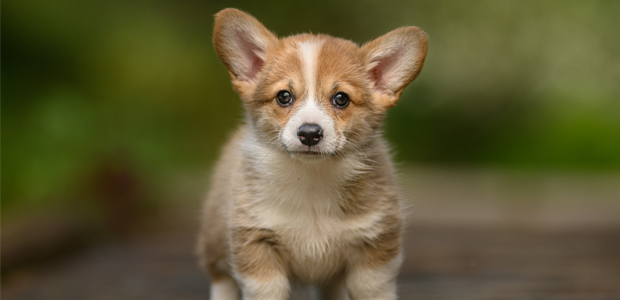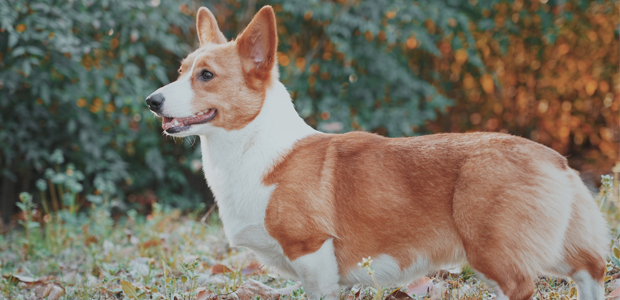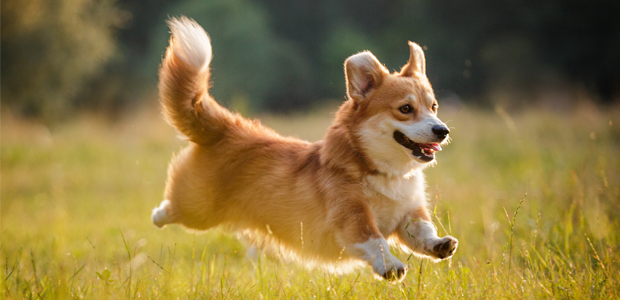The Pembroke Welsh Corgi: is it the right breed for you?
Although they may be small, the Pembroke Welsh Corgi is a sturdy and active dog with a history of herding livestock. Famously adored by The Queen, Corgis are affectionate dogs who are dedicated to their owners.
Appearances can be deceiving, so if you’re looking for a lap dog who doesn’t need much exercise, the Corgi isn’t the breed for you. They love to get out and explore and their exercise needs have led to them being called “a big dog on little legs”.
Pembroke Welsh Corgi summary:
- Active & loving dogs with a history of herding
- Soft medium length with a dense undercoat
- Variety of colours including red, sable, fawn, black and tan
- Corgi life expectancy = 12 - 15 years
- Average size = 25 - 35 cm
- Average weight = 9 - 12 kg
- Estimated monthly cost = Medium
- Exercise needs = Medium
- Attention needs = Medium
- Sociability = High
Please note: A dog’s exercise, training/stimulation and grooming requirements can depend on several factors such as age and health. The same goes for ongoing costs of ownership. For advice on one specific dog, we always advise chatting with a vet.
How much exercise does a Corgi need?
Despite their small size, Corgis need lots of exercise and can become bored if they don’t get enough physical & mental stimulation. They’ll need to be walked for at least 1 hour per day to ensure that their exercise needs are met.
Originally used as herding dogs in the Welsh countryside, their job was to organise and move livestock from place to place. Although the small-statured Corgi might not seem like the best-suited dog for this job, their high stamina levels, braveness and warm coats made them ideal herders.
Their herding history means that they love nothing more than winding walks in the countryside. They’ll happily join you on rambles and hikes, but they don’t make the best running partners.
To keep them happy and healthy, take them to a secure environment where they can run off-lead, with lots of interesting things to see and sniff. As with all breeds, be careful not to over-exercise them whilst they are still growing, as this can have long term effects on their joints.
As well as outdoor activities, Corgis need to stay mentally stimulated with training and puzzle games.
Corgi temperament, socialising and ideal home environment
Corgis are loving dogs that form strong bonds with their owners. They are intelligent and can sometimes be strong-willed, so don’t be surprised to find them marching to the beat of their own drum.
They will generally get on well with children and other pets, although because of their strong herding instincts they have been known to nip the ankles of small children.
Corgis are quite vocal dogs and they make good guard dogs, meaning they do have a tendency to bark at guests. When it comes to living environments, they can adapt to apartment living but would ideally prefer to have some outside space.
They don’t like to be left alone for long periods, but they can adjust with training and plenty of positive reinforcement. It’s good practice to leave them on their own for small periods during training so that they can get used to being by themselves.
Whilst they are still so young and receptive, it's a good idea to introduce your Corgi to other dogs, people and livestock as well as car travel and unfamiliar noises, such as traffic.
Training: how to train a Corgi
Corgis are intelligent dogs, but they tend to be independent thinkers and can be strong-willed. You need to make training worth their while. Be patient and give them plenty of praise and treats when they show good behaviour.
They don’t respond well to heavy-handed treatment or scolding, instead preferring positive reinforcement, praise and plenty of treats. Keep training sessions short, reward-based and different each time.
As is the case with all breeds, Corgis will start to approach new experiences with caution when they are around 12 weeks old. Therefore, it’s really important for their development that they experience as many different situations as possible.

Grooming: do Corgis shed?
Corgis have a “double coat”, a thick undercoat that helps to keep them warm in cold conditions. This is covered by a longer, soft overcoat, which will shed, especially during the spring and autumn.
They will benefit from a thorough brush a few times a week to make sure their coat stays in tip-top condition. You can get them used to this by starting the process when they’re young, working it into their daily routine.
Brushing provides a great opportunity to bond with your dog. They may also benefit from professional grooming every few months.
They do shed their fur during the spring and autumn. If you’re precious about your furniture, they might not be the right breed for you, as they love nothing more than a lounge on the sofa.
You’ll only need to bathe your corgi if they get muddy or they roll in something smelly. Complete your Corgis grooming routine with regular tooth brushing, nail clips and ear checks.
Cost of owning a Corgi
When considering the lifetime cost of owning a Corgi, remember to take into account the following costs:
- Corgi food and dietary costs
- Veterinary care
- Pet insurance
- Kennels or dog sitters
- Regular dog grooming costs
- Toys and equipment
Are Corgis prone to any health problems?
Corgis are prone to certain health problems, just like all breeds. This doesn’t mean your dog is guaranteed to contract any particular disease – it’s just something to bear in mind.
To keep your Corgi as healthy as possible, monitor them closely and attend routine 6-month health checks with your vet. This will allow the vet to give your dog a thorough check-up and to pick up on minor (often symptomless) conditions before they have a chance to escalate into something worse.
Possible health complications for Corgis include:
- Canine dental issues and gum disease
- Infections
- Obesity and weight problems in dogs
- Allergies (including flea, food and pollen)
- Hip dysplasia
Before welcoming a new dog into your household, make sure you’re able to cover the costs of any routine or emergency medical treatment they may need. Pet insurance will help massively with this. Why not ask your vet about their recommended pet insurance policy?

Corgi dietary requirements
Your Corgi will need a balanced diet rich in nutrients, vitamins, and minerals. It’s best to feed them complete dog food to ensure that they are getting the right amount of vitamins and nutrients.
Growing pups may prefer 3-4 smaller servings during the day, rather than two larger meals. This can be reduced to two meals a day as your dog gets older.
The recommended portion size will depend on your individual dog. You’ll need to take into account their activity level, age and metabolism. To avoid weight gain, make sure your Corgi has a healthy and balanced diet and gets plenty of exercise.
Are Corgis suitable for first time owners?
Corgis can make great first-time dogs, due to their affectionate nature, intelligence and small size. They are happy in most environments and get on well with children.
If you have done your research beforehand and you have enough time to dedicate to training and walking, owning a Pembroke Welsh Corgi can be an enjoyable and rewarding experience.
Need more info?
For more info on finding the best dog breed for you and your lifestyle, have a chat with your vet. Find your nearest vet using our Find a Vet page.


